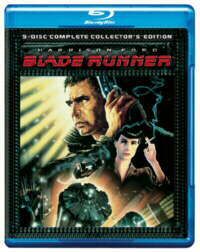 My latest Sympatico/MSN DVD column
My latest Sympatico/MSN DVD column — which is not up yet, but will be soon — focuses on the DVD event of the season and possibly the year: Warner’s new edition of Ridley Scott’s “Blade Runner”, now fully restored, remastered and retooled for its 25th anniversary.
As I mention in the piece, I’m not the biggest fan of the movie; yeah, it’s gorgeous and amazingly constructed, but I’ve always found it a little boring to sit and watch. But as a cinematic landmark, it’s as important as, say, Lucas’ “Star Wars” or Scott’s “Alien” — it’s a watermark for what the science-fiction genre can accomplish, and a signpost for where it’s going.
I also don’t think Scott’s endless tinkering with the film has really helped it that much. Losing the studio-enforced narration and the tacked-on happy ending, that’s fine; it’s the other thing that bugs me. Central to Scott’s 1992 “director’s cut†(which, fifteen years later, turns out to be a director’s cut in progress) is the unequivocal revelation of Rick Deckard as one of those pesky replicants – an identity twist that had only been hinted at in the original theatrical release. The new cut retains that concrete certitude, and I think – as I thought fifteen years ago – that it still feels wrong.
The best virtue of “Blade Runner”, aside from its marvelous visuals, is its sense of foggy ambiguity. The human characters are portrayed as dithering, confused and ineffectual; the replicants are sleek, poised and sexy, with one exception –- or two, if Scott is to be believed. Sure, sidekick Gaff is slick and sharply dressed, but we never see him do much; all he does is serve as Deckard’s taxi driver and make those damn origami animals.
Fortunately, documentarian Charles de Lauzirika understands that the central issue of Deckard’s identity is something that’s intrigued and annoyed fans of the film for years, and even though he leaves it out of the epic making-of documentary, he’s included a nine-minute featurette on Disc Four, “Deck-a-Rep”, that examines the question thoroughly. (Bottom line: It was Scott’s idea, and he thinks it’s obvious, while the actors and writers believe otherwise.)
The person who makes the strongest case for Deckard’s humanity? Frank Darabont, a filmmaker who doesn’t exactly have the best track record for understanding the essential nature of his text.
I guess that’s irony for you …
Norm, contrary to your (and many others’) mistaken assumption, the unicorn dream does not remove ambiguity from the movie or unequivocably prove that Deckard is a Replicant. What it does is add ambiguity where previously there was none. In the original theatrical version, Deckard was resolutey human, without any possibility of assuming otherwise. The voiceover narration made sure of that. The removal of the narration and the insertion of the unicorn opens the question, but does not definitively answer it.
Yes, Ridley Scott has stated that he feels Deckard is a Replicant. Good for him. That’s his opinion, and he is welcome to it as all viewers are. If he had really wanted to hammer the point home, he could have added a new zowie twist ending to the “Final Cut” in which the revelation is made. But he didn’t. He wisely left the matter ambiguous, something for viewers to continue pondering and debating for years to come.
For the record, in my mind Deckard is and always has been human. The story wouldn’t work nearly as well if he were a Replicant. But the question and the ambiguity are important, not just for the viewer but also for Deckard himself, always left with that sliver of doubt: “Am I really who I think I am?”
I agree with your ultimate assessment — the movie only really works if Deckard is human. (Rebelling against the entrenched power structure and choosing to love the Other kinda loses its moral weight when it turns out you were an Other all along.)
But there _is_ physical evidence for the theory in the ’82 cut, when Ford steps into Young’s lighting in the apartment scene and, momentarily, gets the same reflection in his pupils that all the replicants exhibit at some point during the course of the film.
Obviously, this is a nod to the viewer — we’re told replicants can’t be detected by anything as simple as this — and it’s one that’s been pissing me off for 25 years.
Stupid replicants.